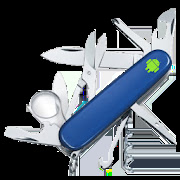In performing building inspections and assessments, there are a number of apps that have proven useful to me, and perhaps you can benefit as well. Below are some that I have found to be particularly useful and in particular, have allowed me to use my phone for a task that I would have had to carry a separate tool for in the past. I am interested to hear of others that you use and why. Note that the apps listed below are for the Android operating system and there may or may not be similar ones for iOS. Also, I make no warranties or guarantees as to the accuracy or functionality of these apps and I am not affiliated with them in any way nor do I receive any benefit from their use or purchase. I offer this information simply as my own personal experience (your mileage may vary, so to speak).
On to my list:
 Army Knife for Android - This is a small group of apps bundled together that includes a unit converter, timer, stopwatch, compass, bubble level, magnifying glass, mirror and more. I particularly like the bubble level and magnifying glass. While the bubble level will never replace a good 4' level, it is accurate enough to quickly check the slope of ramps (for ADA compliance, etc.) and the magnifying glass can be helpful when reading small print.
Army Knife for Android - This is a small group of apps bundled together that includes a unit converter, timer, stopwatch, compass, bubble level, magnifying glass, mirror and more. I particularly like the bubble level and magnifying glass. While the bubble level will never replace a good 4' level, it is accurate enough to quickly check the slope of ramps (for ADA compliance, etc.) and the magnifying glass can be helpful when reading small print. GPS Essentials - This is another group of apps bundled together, with maps, GPS satellite monitors, waypoint tracking and more. I particularly like the compass feature which displays both a traditional compass face, but also customizable fields for latitude, longitude, elevation, and even accuracy.
GPS Essentials - This is another group of apps bundled together, with maps, GPS satellite monitors, waypoint tracking and more. I particularly like the compass feature which displays both a traditional compass face, but also customizable fields for latitude, longitude, elevation, and even accuracy. 
Lux Light Meter Free - This is a pretty basic but very function light meter that can help you measure the illumination using the camera's sensors. It has the ability to display the output in foot-candles or lux, and you store, recall and calibrate it. I compared the accuracy of this to the old standby GE model 217 light meter that I have used for years and found it to be very accurate - so there is one less device I need to carry around with me.
Free42 - Many of my fellow classmates in college were using HP calculators with its venerable "Reverse Polish Notation (RPN)". I didn't really understand the attraction back then and didn't take time to learn it. Later, however, I did and I realized what they had been so fond of. Once you get comfortable with RPN, you really don't want to go back. There are lots of HP emulator calculators and RPN calculators to choose from but this one has served me well for years and it saves me from having to carry a separate calculator in the field.
GEO Tracker - For those of us who sometime have to perform site work and would like the ability to look back after walking that site to see exactly what we had covered, this is a very handy application. Start it when you begin your work. Stop it when you are finished. When you are done it plots your path on a map with lots of helpful statistics. This is a useful app for lots of other activities too, such as biking or hiking but I have found it a useful work tool and so it makes this list.
Google Photos - This is a no-brainer. We take photos with our phones all the time. Although for much of the work I do, I use a dedicated point-and-shoot Canon HS100. The Canon has been extremely reliable and it is easier to hang that from a lanyard around my neck and to take photos with it than pulling my phone from my pocket, launching the app, and taking the photo with my phone, I use both and then use Google Photos to back them up and organize them. This is one app that doesn't necessarily prevent me from bringing a dedicated camera into the field, but it is great to know that it is there in case the primary camera fails, and the app itself is very useful beyond just the picture taking.
These are some of my favorite go-to apps to help me to my work. Comment below on yours!



No comments:
Post a Comment